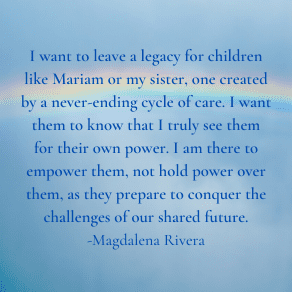
It’s a scene I’ve been a part of countless times: I’m tutoring a young girl – Mariam – after school on Chicago’s South Side. When she needs a break, we read a graphic novel about a caveman family. She reads the pages on the left, while I read the pages on the right. When we return to the tedium of division and decimal conversion, I constantly remind her that she is the smartest 8-year old I know. Every once in a while, she sneaks in a plea for the answer, but I’ll always shake my head in practiced refusal. After all, I want her to know that she is the star of the show, with me merely the Watson to her Holmes as we face a brand new case with every new mathematical conundrum. I’m telling her that she can do it, that I believe in her abilities despite her own doubts. I do this because I care about her, because I want my actions to reflect my confidence in her capabilities and potential.
I believe caring starts with equipping children with the audacity to hope and the confidence to create change for a better world for themselves and their peers. Support breeds support, as children learn to mimic the actions of the people who care for them. It requires older people like myself, who just now are experiencing a taste of adulthood, to show unconditional support to the children we care about; to say “I see and believe in you” through our actions. Furthermore, caring requires being a point of stability for children in the midst of chaos; in doing so, we encourage them to take risks with the help of unconditional support along the way. Once younger people have such tools, they can pass kindness and support to those around them, creating a cycle of care that allows us to collectively work towards a better future.
Furthermore, I want to actively engage younger generations, not just passively care for them. True caring requires teaching children that “you can do it,” not just that “I will always do it for you.” I want them to be able to grow up without a trap of dependency that leads to a loss of confidence in their own abilities. When I tutor Mariam, my goal is never for her school assignments to be “perfect” in my or her teacher’s eyes, but to be perfectly her own. She should be the creator, the problem solver, and the one whose work capabilities, confidence, and potential shine through.
As a child, I had the privilege of having a mother who encouraged me to pursue my passions, teachers who taught me to advocate for myself, and friends who cheered me on no matter what. I take the tools I have to pass my opportunity forward to the children I love and support — through tutoring Mariam in Hyde Park, working with students to improve their debating skills, and last minute homework help for my little sister. I strive to be someone who uses my individual empowerment to support and empower the children around me as best I can, hoping to continue mentoring and tutoring in college and beyond. Even as an adult, I still want to let children know that I believe in them unconditionally. I want to leave a legacy for children like Mariam or my sister, one created by a never-ending cycle of care. I want them to know that I truly see them for their own power. I am there to empower them, not hold power over them, as they prepare to conquer the challenges of our shared future.
